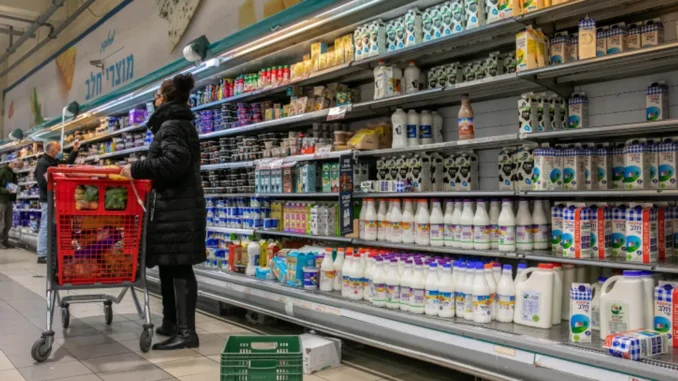By Johanna Afriat, i24 NEWS

Five groups hold almost 50 percent of the agri-food market – driving up the cost of living
The high cost of living in Israel is mainly explained by the existence of monopolies which prevent the emergence of free competition. There are 85, all sectors combined, a record among OECD countries.
This lack of competitiveness is particularly marked in the agri-food market, dominated by five major groups: Tnuva, Coca-Cola, Elite-Strauss, Osem and Telma-Unilever. Thanks to their merger-acquisition strategy, these companies hold nearly 50 percent of the agri-food market, while 1,108 small and medium-sized producers share the rest.
Holding this dominant position allows these groups to set prices freely and to decide on promotions and quantities. As a result, food products cost between 20 percent and 25 percent more in Israel than in Europe. According to a new study published by money.co.uk this week, the Jewish state even ranks sixth in the world in terms of the average price of a shopping basket.
The Tnuva group, for example, has 71 percent of the market share for milk, and 91 percent for butter. It also dominates the market for frozen vegetables, fish and meat. The Coca-Cola group is also at the head of the Tara dairy, Neviot mineral water and Prigat fruit juices: it thus represents 90 percent of the cola market share in the country, and 43 percent of the total beverage market in Israel. The Elite-Strauss group concentrates 78 percent of the coffee market share.<
>
<
>
<
>
The variety of brands offered by supermarkets is therefore largely illusory.
Some groups like Coca-Cola even ensured until recently an exclusive position in certain convenience stores and neighborhood grocery shops, by prohibiting these retailers from selling the products of other manufacturers.
In March 2017, Dudi Wertheim’s Central Bottling Co. (Coca Cola Israel) was fined nearly $20 million for exploiting its monopoly status and attempting to undermine competition.
Monopolies also exist in the area of imported products, with only four official importers operating in Israel. The masters of their own domain, they force brands to sign exclusive import agreements, eliminating competition and fixing prices at the level they want.
Result: in Israel, the price of Colgate toothpaste or Rexona deodorant is higher than elsewhere. And if the rise of the shekel should logically have led to a drop in the price of imported goods, this is not the case, because importers are taking advantage of the shift to increase their profit margins.
Many practices common in Israel are impossible in other countries. As the distributor Superpharm knows well, since it imports cosmetic products into stores in Israel, and simultaneously to chains across Europe. When it operates in Poland, the pharmacy is in competition with other importers, and is obliged to align its prices. Meaning it sells the same products there as in Israel, but for much cheaper.
Stifle the competition
The muzzling of competition is also practiced by supermarket chains.
In agreement with the large groups, they highlight the products of these monopolies on their shelves and in their advertisements, often with promotions which in reality only reflect the normal price of a product.
Also frequently possessing their own labels, the major distributors do their best to block the progress of small producers, suffocating competition. This is how independent brands cover only 3 percent to 11 percent of sales in the country, whereas in France or Germany this proportion is 40 percent.
And when the big supermarket chains buy the merchandise from the small producers – which is 30 percent to 40 percent cheaper – they often take the opportunity to put the difference in their pocket. There is therefore no impact on shelf prices.
Conditioned by advertising, but also the layout and quantity of products on store shelves, Israeli consumers chooses the big brands, maintaining the vicious circle of high prices.
Things may be changing, however, with a recent rebellion among Israeli shoppers.
Faced with the price increases announced by certain manufacturers such as Osem, customers have responded by boycotting the brand’s products. Result: the famous manufacturer of the Bamba snack finally gave up its planned price increase.
While the cost of living continues to rise in Israel, experts recommend breaking the monopolies to bring out true price competitiveness. Reacting to the social discontent following the recent rise in prices in many sectors, Prime Minister Naftali Bennett pledged to take the necessary measures to promote competition.
But more than promises heard a thousand times from their leaders, Israelis today demand action.
And there is precedent for such intervention.
The opening to competition of the Israeli telephony market in 2011, allowed a drastic fall in the prices of phone contracts and services, showing that breaking monopolies was possible. Provided that this is accompanied by real political will.
Sources: “Calcala” by S. Benoliel, The Marker
Johanna Afriat is a journalist with i24NEWS’ French language desk.
<
>
<
>
<
>



Leave a Reply
You must be logged in to post a comment.